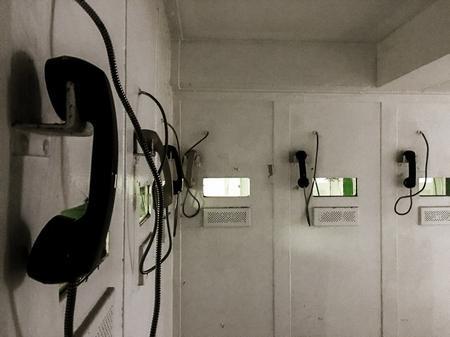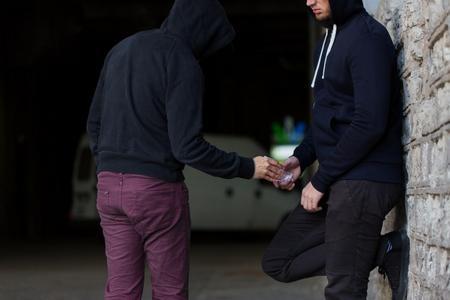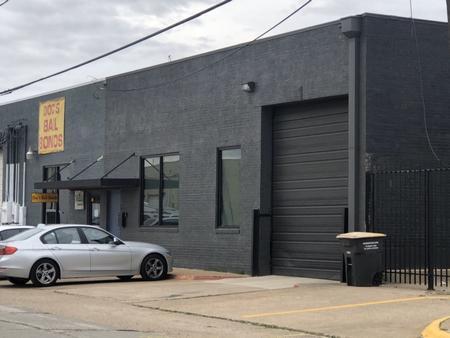Recent Blog Posts
How to Find an Inmate in a Dallas Jail

When a loved one is unexpectedly jailed, it can feel like a never-ending struggle to locate where they are being held. Most of us do not have experience locating an inmate, so it can be difficult knowing where to even begin looking. For Dallas-Fort Worth Metroplex residents, Doc's Bail Bonds makes the inmate locating process more direct so you do not have to spend time confused and lost. Doc's can help you easily locate your inmate and begin the process of securing their bail bond and getting them released. We are the most trustworthy bondsmen in DFW, and we are committed to working with you, no matter the circumstance.
Getting Started
The first thing to do when getting ready to locate your arrestee is being certain that the court has a bail set for them. Give this step some time. It might not be a bad idea to wait a few hours before you start searching. A bail needs to be set because that is how you can be sure the booking process is finished, which is important because an inmate cannot be bailed out unless they are finished going through booking. Although it can be difficult, you need to be patient for this step.
Dallas Inmates Must Wait for Cheaper Phone Calls

Dallas’ county commissioner and sheriff have delayed the signing of a new jail phone call bill that could lower the price of inmate calls. The fight for a bill that satisfies both the county and the families of inmates has gone on for 5 years. Discussions are still in progress as to how the bill should be handled. If you or a loved one has been arrested in DFW and needs help securing an affordable bail bond quickly, Doc’s Bail Bonds has you covered.
THE CURRENT PHONE CALL BILL
Established in 2014, the current jail phone call bill proved satisfactory for some time, but now there have been copious calls to change the bill that is in place. The current bill has jail phone calls going at a rate of 24 cents per minute. There is also a deposit that has to be made in order to pay for these calls, which has a fee of $3 if you go through the county vendor and $5.95 if made by automatic payment. This agreement was more affordable than previous ones, but there have still been complaints about the costs. Some feel that it is unethical to charge inmates to speak with family members, so they have advocated for free jail phone calls.
How Do Sting Operations Work in Dallas?

When you hear the term 'sting operation', you probably havethe image of cops ducking around corners with their guns drawn, ready to jumpout at any second. While that is a possibility, there are several differentways a sting operation can go down. There are also many risks involved withthese operations, and they are planned meticulously to prepare for any outcome.We are going to explain how a sting operation might unfold. If you or a lovedone has been unexpectedly arrested in DFW, Doc'sBail Bonds can get you out of jail fast and affordably. We are flexible andunderstanding of every case, even if you got caught in a sting.
What is Considered a Sting Operation?
Over the decades, sting operations have umbrellaed over avariety of police operations. Although there are several things that can becalled a sting operation, there are four main components that they all have incommon.
1. An opportunity for a crime to be committed, typically created by police
How Often Do Police Lineups Identify the Right Suspect?

When police are on the hunt for a suspect, they will use several methodsto narrow down their search. One method that likely comes to mind is the use ofa police lineup. Although we have all seen lineups on screen, many do not knowhow they work in real life. There is also the question of how reliable theyare. How often do police lineups help identify the right suspect? We are goingto give you a quick lesson on how police use lineups to help solve their cases.Doc's Bail Bonds is hereto help DFW residents get out of jail so they do not end up in one of theselineups.
What Are the Types of Police Lineups?
There are three main types of lineups police might use in aninvestigation: simultaneous, sequential and multiple identification.
Simultaneous
The image that likely comes to mind is called a simultaneouslineup. This type of lineup consists of several suspects who have similarphysical characteristics lining up to be looked at by a witness. The suspects lineup in a row and will usually speak or perform an action for the witness to see.The witness then tells the police which person they recognize as the suspectand make an official statement.
Dallas' Rapping Panhandler Case Comes to a Close

The 2018 lawsuit of Dallas' rapping, panhandling activistagainst the city has finally closed. The lawsuit was over the constitutionalityof the misdemeanor charge that comes with roadside solicitation, orpanhandling, in the city of Dallas. When you are arrested for any misdemeanorin the DFW Metroplex and need help getting out of jail quick, Doc's Bail Bonds are the ones to turn to.We can bail you out fast and at any time of day no matter what your case is,including panhandling.
How the Issue Began
In 2018, Yvette Gbalazeh, a marijuana legalization activist,was arrested and charged with a misdemeanor for panhandling on the streets ofDeep Ellum. Once she was arrested for violating one of the city's anti-panhandlingordinances, she filed a suit. With the precedence of a similar Houston lawbeing shut down in 2013, she claimed the ordinances violated the FirstAmendment. After failing to make the case a class-action lawsuit, Gbalazehcontinued to push for compensation and for the enforcement of the city's twoanti-panhandling laws to be stopped.
What Happens If You're Caught with Marijuana in Dallas?

With marijuana becoming legal in more and more parts of the country, there can be a lot of questions about how exactly it is allowed to be possessed. Even within the same state, different cities and counties can have vastly different policies on how to handle marijuana possession. We are going to share with you what to expect if you or a loved one is caught with marijuana in the Dallas Fort Worth Metroplex. And if you get stuck in jail for marijuana possession or anything else, be sure to contact Doc's Bail Bonds.
What Exactly Is Legal in Texas?
Well, the short answer is that the possession and usage of marijuana is still very much illegal in the state of Texas, but some forms of cannabis have become legal to possess and use. Minimal level THC is allowed to be possessed, specifically in the form of oil. This low concentration THC is also known as hemp. CBD products containing 0.3% or less of THC also fall into the category of hemp derived substances, so they too are considered legal all over the state.
5 Groups That Help Ex-Cons Start a New Life

Readjusting to society after incarceration can feel like a lonely task. Many people assume that there are very few places to turn for a second chance, but nothing could be farther from the truth. Believe it or not, there are a lot of resources for ex-inmates to find their way back into the regular routines of life, including employment for ex-cons. Five of those helpful groups can be found right here in Texas! Doc's Bail Bonds wants to point Dallas – Fort Worth ex-cons in the direction of assistance, because we understand the confusion that comes with incarceration and release. You shouldn't have to face the further punishment of unemployment after you've served your time.
1. ExOffenders.net
If you are looking for general reentry information after release and do not even know where to begin, ExOffenders.net is a great database. ExOffenders offers extensive lists of resources available to ex-cons, as well as lists of employers who are known to hire convicted felons. They even provide information on felon voting rights and how to gain back different rights and liberties on the outside.
Why Doc's is Your Best Choice for Dallas Bail Bonds

When a loved one is taken into police custody, there is a frantic search for help to get them out as quickly as possible. Though there are a lot of options when it comes to bail bondsmen in Dallas, it can be difficult to know which bail bond company is the most trustworthy choice for help in your fight for release. Dallas area residents can take comfort in knowing that they have Doc's Bail Bonds ready to back them up at any time. If you are sick of jail time, call Doc's 24/7, 365 days a year!
Here Whenever You Need Us
Doc's Bail Bonds takes pride in our accessibility to the community. We offer a 24-hour hotline operated by a knowledgeable staff who is ready to take your call any day of the year, including holidays. We know how valuable every minute is when getting someone out of jail, so as soon as we answer your call, we start working tirelessly to get your situation rectified. When working with Doc's, never will you have to wait around. We will give you a quote right over the phone within minutes of calling. Once you get your quote, we can begin the paperwork process to ensure your loved one is released as soon as possible. Doc's wants to be the quick, painless cure for you or your loved one's jailtime.
3 Major Ways Jail Time Hurts Your Family

One of the scariest things that can happen to someone is for them to be taken into police custody, as it impacts many aspects of an individual's life. Not only is it difficult for the person being taken away, but for their loved ones it can also be a time of intense uncertainty and fear. Doc's Bail Bonds understands the gravity of jail time, and we are ready to help DFW area families get back together and back on track. Call our friendly bail bond agents any time, day or night, when you or a loved one needs to get out of jail fast.
Decreased Job Security
Jail time can affect your work in a couple of different ways. One way is if you are unexpectedly jailed, you could miss a shift or important meeting, causing your boss and coworkers confusion and distrust in your reliability. Some jobs have very strict policies on no-call/no-shows, and when you are in jail, you will not get the opportunity to call up your employer to explain yourself or find a replacement for a shift.
How to Find an Inmate in a Dallas Area Jail

In times of distress, it can be easy to feel overwhelmed and lost. This is especially true when jail time is involved. The rush to find and free your loved one can often be confusing, daunting even, and it might lead you in a never-ending circle, but Dallas area residents are in luck! Doc's Bail Bonds goes out of our way to make this process less stressful and more direct, no matter where you are in the DFW area.
First, Get Your Bond in Order
Dallas is a big city, and it is vital that you know exactly what is needed to even begin your search. At Doc's Bail Bonds, the first step to locating an inmate is to have their bail set up with the court. Doc's fair payment plans and quick services can get you on the road to finding your friend or family-member in minutes, even over the phone. Speed is imperative when dealing with the jail system. There is no time to bother with a bondsman who cannot set you in the right direction, so just rely on Doc's.










